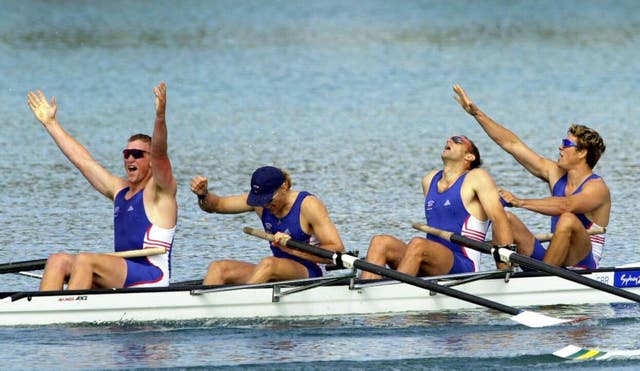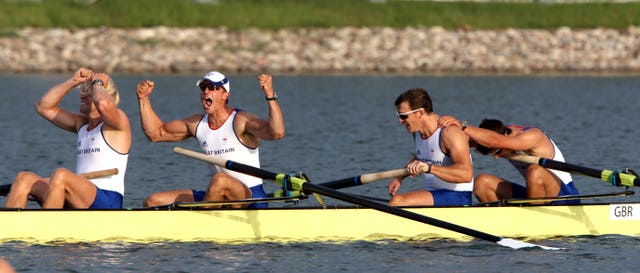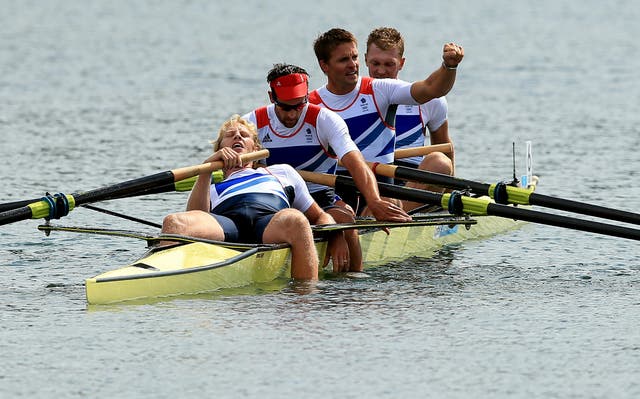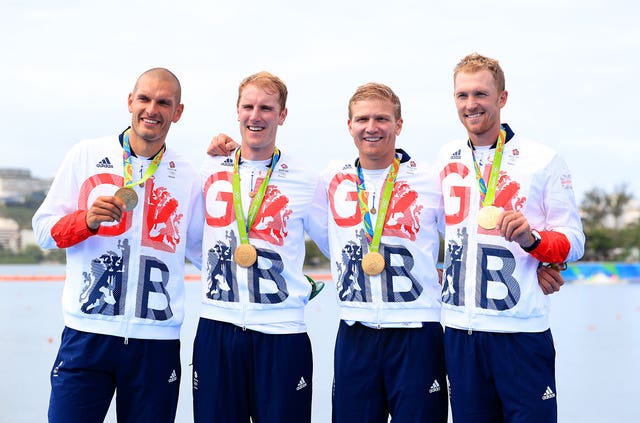
Great Britain’s dominance of the men’s four at the Olympic Games came to an end in Tokyo.
The team of Oliver Cook, Matthew Rossiter, Rory Gibbs and Sholto Carnegie failed to win a medal in an event that had ended in British victory at the last five Games, stretching back to the turn of the millennium.
Here, the PA news agency looks back at Great Britain’s winning run in the competition.
Sydney 2000
 Pinsent, Foster, Redgrave and Cracknell celebrated in Sydney (John Giles/PA)
Pinsent, Foster, Redgrave and Cracknell celebrated in Sydney (John Giles/PA)
Steve Redgrave entered Olympic history by winning his fifth consecutive gold medal alongside Matthew Pinsent, Tim Foster and James Cracknell. A thrilling race saw the British crew win by less than half a second ahead of their closest rivals Italy at Penrith Lakes. It was Pinsent’s third successive Olympic gold and a first for Foster and Cracknell.
Athens 2004
Redgrave "drop the flowers & don't cry" @matthewcpinsent did you learn nothing? Happy Anniversary fellas🥇 #Throwback #13years #Athens pic.twitter.com/iQmPDVxILd
— James Cracknell (@jamescracknell) August 21, 2017
Pinsent claimed his fourth gold medal as Britain pipped world champions Canada. Pinsent and fellow Sydney champion James Cracknell, along with Ed Coode and Steve Williams, won by the narrowest of margins. The Canadian crew cranked up the pressure in the final stages but the GB four dug deep to edge them out in a photo finish by 0.08 seconds, while Italy took bronze.
Beijing 2008
 No Pinsent no problem as Great Britain won again in Beijing (Andrew Milligan/PA)
No Pinsent no problem as Great Britain won again in Beijing (Andrew Milligan/PA)
Williams was joined by Tom James, Pete Reed and Andrew Triggs Hodge as the Brits made it a hat-trick of golds in China. They came from a length down on the Australian crew with 500m remaining to triumph by half a length.
London 2012
 Great Britain celebrate another win in London (Stephen Pond/PA)
Great Britain celebrate another win in London (Stephen Pond/PA)
Britain took gold four for the fourth successive Games as Reed, Triggs Hodge, James and Alex Gregory edged out Australia again at Eton Dorney. Roared on by a capacity home crowd, they blasted out of the blocks to lead after 500m and although Australia stayed within a third of a length with 500m to go, Triggs Hodge gave the call to push and the British stormed away.
Rio 2016
 Sbihi, Nash, Gregory and Louloudis were victorious in Rio (Mike Egerton/PA Wire)
Sbihi, Nash, Gregory and Louloudis were victorious in Rio (Mike Egerton/PA Wire)
Gold number five for Great Britain arrived in style in Rio as Mohamed Sbihi, George Nash, Constantine Louloudis and 2012 winner Gregory edged out Australia once more. Australia pushed their rivals hard again but eventually trailed in 1.83 seconds behind to take another silver, with Italy claiming the bronze.


Why are you making commenting on The Herald only available to subscribers?
It should have been a safe space for informed debate, somewhere for readers to discuss issues around the biggest stories of the day, but all too often the below the line comments on most websites have become bogged down by off-topic discussions and abuse.
heraldscotland.com is tackling this problem by allowing only subscribers to comment.
We are doing this to improve the experience for our loyal readers and we believe it will reduce the ability of trolls and troublemakers, who occasionally find their way onto our site, to abuse our journalists and readers. We also hope it will help the comments section fulfil its promise as a part of Scotland's conversation with itself.
We are lucky at The Herald. We are read by an informed, educated readership who can add their knowledge and insights to our stories.
That is invaluable.
We are making the subscriber-only change to support our valued readers, who tell us they don't want the site cluttered up with irrelevant comments, untruths and abuse.
In the past, the journalist’s job was to collect and distribute information to the audience. Technology means that readers can shape a discussion. We look forward to hearing from you on heraldscotland.com
Comments & Moderation
Readers’ comments: You are personally liable for the content of any comments you upload to this website, so please act responsibly. We do not pre-moderate or monitor readers’ comments appearing on our websites, but we do post-moderate in response to complaints we receive or otherwise when a potential problem comes to our attention. You can make a complaint by using the ‘report this post’ link . We may then apply our discretion under the user terms to amend or delete comments.
Post moderation is undertaken full-time 9am-6pm on weekdays, and on a part-time basis outwith those hours.
Read the rules here